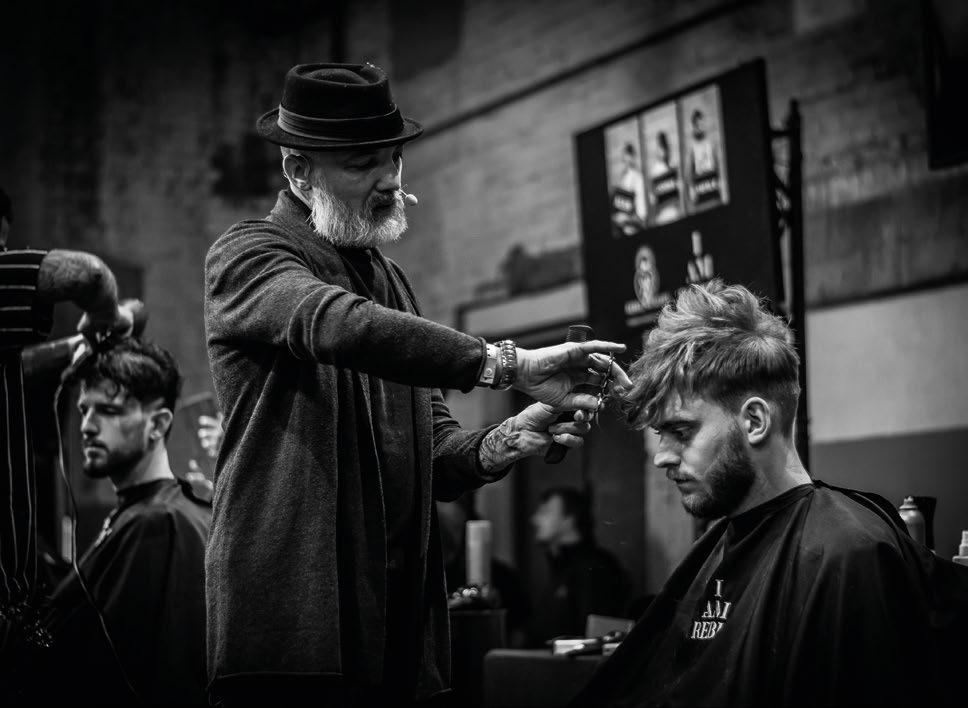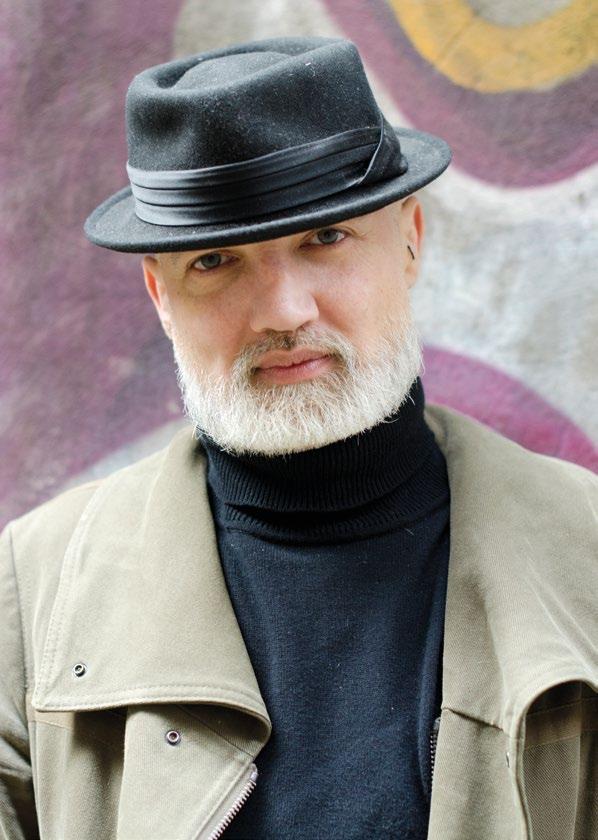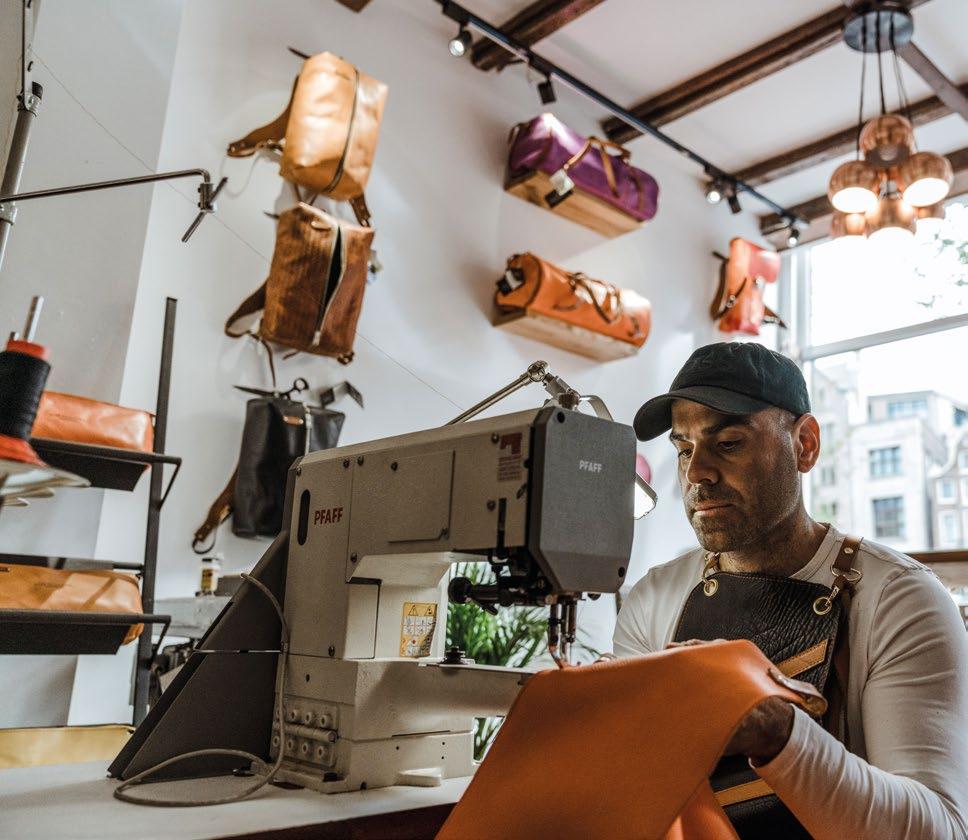
9 minute read
REBEL WITH A CAUSE Interview with Alan Findlay
INTERVIEW ALAN FINDLAY
REBEL WITH A CAUSE
Alan Findlay puts people – staff and clients – at the heart of everything he does. He has a clear vision on the keys to a successful barbershop and a happy working life. With three decades of experience under his belt, he’s as passionate as ever about developing professional skills, promoting the barbering community and training young barbers to build careers in the industry. He says it all comes down to experience, top-quality haircuts and the barber’s skill set. BarberSociety met up with Alan virtually to talk about his career, fostering client relationships and staying in step with the times. A lively conversation with this Glaswegian who has a gift for the gab and an engaging turn of phrase. Gaun Yersel!
Didn’t want to kill people Alan Findlay, who stands at the helm of two Rebel Rebel shops in Glasgow, got into the barbering industry by chance after deciding the army wasn’t for him. Over the past thirty years, he has carved out an impressive career and is today one of the UK’s top barbers. Alan recaps his career: “I was in the army when I was 16 and decided after about six months that I didn’t want to kill people and left. I went to a job centre and there was an opening for an apprentice hairdresser, so I started out in hairdressing and was a hairdresser for a couple of years.” On-the-job learning With his level 2 hairdressing certificate in the pocket, he moved to Glasgow in 1989 and got a job at a local barbershop. “Back then the barbering industry didn’t have any education whatsoever. Long hair was popular in the sixties and seventies, which meant many local barbershops that only cut short died off. Hairdressing got a massive boost in the 1960s and 1970s with big chains, product brands, and celebrity. Barbering just went into the doldrums and stayed there until last decade. So when I started out almost 30 years ago, I’d only been
trained at college to do basic haircutting and hadn’t even learned to use clippers. So I had to learn everything on the job and basically copied the guy working next to me. I worked at conveyor belt barbershops for fourteen years and then I got the opportunity to get my own place in Glasgow in 2003. I worked there for about three of four years and then teamed up with a friend of mine who worked in finance and we joined forces and set up Rebel Rebel in 2007.”
Opening Rebel Rebel was a turning point in Alan’s career and gave him a vehicle for putting his vision for barbering into action. “That’s when I really zeroed in on my ideas and what I believe in. It was a unique time to open a barbershop because short hair was becoming fashionable again and men were paying more attention to their appearance. I was ready for this step with a hairdressing background, extensive knowledge of the hairdressing world and sound barbering skills I’d developed during my 14 years working at barbershops in Glasgow. So when I opened Rebel Rebel, I had a creative vision for the company. That’s the short version of how I got to where I am today.”
Giving the vision wings Alan set about putting his vision into practice by focusing on the client experience, creating a supportive company culture and building lasting client relationships. “My vision was to create a company that was fun for people. I’m a big believer that if you’ve got happy staff you’ve got productive staff and satisfied customers. There’s a triangle between the business, the staff and the customers. It’s all about keeping all three happy. That’s why I wanted to be a good boss and ensure my staff received the best training possible. So I developed training strategies and have always trained my own staff. I’ve trained around a hundred people over the past thirteen years. I’ve since launched my own barber academy as well, so that laid the groundwork for my approach to training. I started out working at a conveyor belt barbershop where you couldn’t take any appointments and barbers were two a penny. It was all about doing the haircut as quickly as you could – get em in, get em out, bums in seats. My attitude was totally different I wanted to take my time, have better trained barbers and better customer service. I wanted it to be a positive experience. It worked really well and took off very quickly.”
Building lasting client relationships Developing lasting relationships with clients and taking a longterm view are key to building a business that will stand the test of time, Alan explains: “You’ve got to remember that each new client you get who has a good experience will come back maybe twelve times a year. So it’s not just a 35-pound haircut, it’s twelve times that. It’s all about ensuring they come back month after month, year after year.”
Alan is convinced that word-ofmouth is by far the best way to expand the clientele. “For every one person you see, you want them to pass on the word to four or five people that you’re a really good barber and that they had a great experience. If you can have that effect on your clients, it will be super easy to build your business.”
Gaining a rapport with clients is more important than ever during the coronavirus pandemic. “The relationships with your clients are even more vitally important during this crisis, because they’re more likely to come into the city centre just to see you even if they aren’t working in the centre at the moment. So all that groundwork you laid down in building rapport with your clients should be yielding dividends now if you’ve done your job properly. If you didn’t care about your clients and just did it for the money, you’re probably struggling right now.”
Never sell a product you don’t believe in Alan carries two lines of products in his shops and sees helping clients learn how to use products properly as an integral part of the service. “First and foremost, I don’t like to use anything I don’t believe in. If I don’t believe in it, I’m not going to sell it to anyone. I only sell products that I think are relevant and that clients can use at home to create the same look as in the shop.”
The focus is on understanding the client’s needs and selecting the product that works for them. “You’ve got to understand what the client’s needs are and then show them while you’re styling their hair how to use the styling product. If you want height or curl in your hair, you need a product that will enhance that. I tell my clients that you really only need two products for your hair – one to prep it and one to style it. These two products should be the focal point during the consultation. It’s my responsibility for my clients to know how to use the products. When you have these kinds of conversations with clients, they usually don’t see it as hard sell. It comes down to information – if you take your time to explain the product in detail and which product you should be using.”
It’s all about trust As with every aspect of the client relationship, it is a matter of trust. Alan explains: “If you’ve already gained their trust through their hair, you can also gain their trust with the product. I’m trying to help you, here’s what you need, if you buy this it will last you this amount of time and your total spend per year will be X amount per year.”
Experience sets Rebel Rebel apart What makes Rebel Rebel distinctive? “The first and most important thing is experience. If I take on a young person, I want them to feel that they can work with me long term and that I can help them build a career. They can then in turn help me build my business so we can expand this as a collective. I want to share my company with my staff so that they become part of the company.”

Alan says everything revolves around three aspects: “Experience, the quality of the haircut itself and the skill set of the barber. I want my customers to feel that these guys know what they are talking about – they know the products, styles and techniques inside out.”

Staying in step with the times What does Alan see as the major trends in barbering? “Trends can be very localised and very globalised now because of the internet. The localised trend in Glasgow is the French crop with high fades and low fades, that’s been the main haircut over the last nine or ten years. The trends tend to change every decade and I am starting to see some signs of change – mullets are making a comeback, flattened tops and jaggy at the back. The trends right now can go from being very classic and polished to rough and messy.”
Promoting the international barber community Alan is an active part of the international barber community and believes in supporting the profession through taking part in events. He is a member of the B.O.M.B. Squad (Barbers of Modern Britain), which is the UK’s first creative barber team. They give shows and demonstrations at a number of international barber events. He has very fond memories of BarberSociety Live. “I met Marc van de Hare at an event in Cardiff. I was on stage and there was this big tall guy staring at me at the front of the crowd holding up a BarberSociety banner. So I chatted with him afterwards and we got on really well. He asked if I’d like to come to BarberSociety Live, but I didn’t realise how big a thing it was going to be. Of all the events we’ve done, the one I always look forward to is BarberSociety Live. The reason is: it’s a great show, a big family-run event. It’s really about the experience, not about product companies, how much stuff I can sell – the focus is on an experience, meeting interesting people and having a great time.”
Looking to the future Alan looks to the future with confidence. “I foresee a huge wave of creativity after Covid-19 passes, because people have all this pent-up creative energy and will really want to get out and do some cool stuff. And looking further into the future, I want to create a company that’s owned by the workforce. When I retire, I would like to be able to sell my shares in the company and pass it on to the employees who are running this company.”










